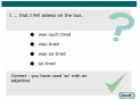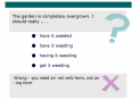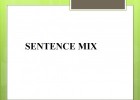Cargando...
Recursos educativos
-
Nivel educativo
-
Competencias
-
Tipología
-
Idioma
-
Tipo de medio
-
Tipo de actividad
-
Destinatarios
-
Tipo de audiencia
-
Creador
-

Build you vocabulary (I)
EduBook Organización
- 1156 visitas
Match the following words from Chapter Four with their definitions. Verbs are in the infinitive here, but could be in a different form in the text. an argument (noun) evil (adjective) mad (adjective)…
-

Speaking: making remarks with ‘What’
EduBook Organización
- 699 visitas
Look at these sentences: ‘What a fine gentleman!’ ‘What a miserable place this is!’ We use this type of sentence when we would like to emphasize how big, nice, bad, good someone or something is.…
-

Writing (PET)
EduBook Organización
- 2672 visitas
Imagine you are Johnsy. Write a note to Sue inviting her to come to visit you in the Bay of Naples. In your note you should: tell her when you arrived say what you like about Naples suggest when she…
-

So and Such
BBC Organización
- 3921 visitas
In this resource we practise the structures "so + adjective + that" and "such + adjective + noun + that" (to describe reasons and results) by doing three quizzes, and a writing…
-

Have something done
BBC Organización
- 2654 visitas
In this resource we practise using 'have' with a noun and a past participle by doing three quizzes, and a writing activity. In the first quiz we match the beginnings of sentences to correct endings; in…
-

Possessive pronouns
EduBook Organización
- 1994 visitas
'THE MAN CUB IS MINE' We use possessive pronouns when we don’t want to repeat a noun. These are the possessive pronouns: mine yours his/hers ours yours theirs Is that your cub? Yes, It’s…
-

SentenceMix Tool
Francisco Cerrillo Docente
- 1 lo usan
- 1819 visitas
This is a template for making sentence ordering exercises easily and quickly. Simply type or paste sentences (or clauses, noun phrases etc) into the top box. Click the arrow key and the program will…
-

Grammar - Go back to the text
EduBook Organización
- 1603 visitas
Countable and Uncountable Nouns Some nouns in English are countable. They have a singular and plural form. For example: an island → islands (noun + -s regular plural) a man → men (irregular plural)…
-

Vocabulary – collocations
EduBook Organización
- 1508 visitas
Collocations are words that we often find together. They can be adjectives with nouns, adverbs with verbs, verbs with nouns and so on. Here are some common verb + noun collocations. All of them are in…
-

Grammar - Activities
EduBook Organización
- 1413 visitas
Reflexive pronouns We use reflexive pronouns when the subject and object of a verb are the same person. In the text you read: Then I tried to free myself, and I managed to break the ropes around one of…
Te estamos redirigiendo a la ficha del libro...






